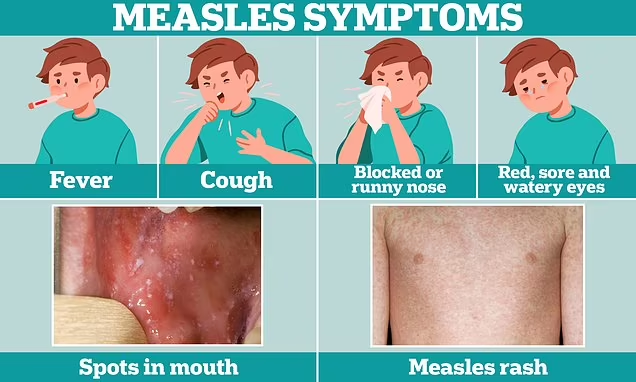Measles is a very contagious disease that causes fever, a red rash, cough and watery eyes. It can have serious complications in some people. Getting the measles vaccine is the best way to prevent getting and spreading measles.Measles (rubeola) is a viral disease that causes fever and a rash. It’s highly contagious and spreads through the air when a person with measles talks, coughs or sneezes. There isn’t a medical treatment for measles — you have to let the virus run its course. The best protection against measles is to receive the measles vaccine.Since the introduction of a vaccine, measles isn’t nearly as common as before the availability of a vaccine. However, because immunization rates have been declining in the United States, outbreaks of measles have occurred in recent years. Vaccination rates are also not high in many parts of the world. This means you can get measles when you travel internationally. Anyone who hasn’t been vaccinated against measles is at risk of getting it.Measles is also called rubeola, 10-day measles or red measles. It’s not the same as German measles (rubella).

Causes of Measles:
Measles is caused by the measles virus, a highly contagious virus that infects the respiratory tract:
How it spreads
The virus is spread through the air when an infected person breathes, coughs, or sneezes. It can also spread through direct contact with an infected person’s secretions or by touching a surface that has the virus on it. The virus can remain active in the air or on surfaces for up to two hours.
How contagious it is?
Measles is very contagious, and if you haven’t been vaccinated, you have a 90% chance of getting it if you’re in a room with someone who has it. You can be contagious with measles up to four days before the rash appears, and up to four days after the rash goes away.
Who it affects?
Anyone can get measles, but it’s most common in children. Risk factors include children with immunodeficiencies, infants who lose passive antibodies before routine immunization, and travel to areas where measles is common.
The best way to prevent measles is to get vaccinated. If you’ve been exposed to the virus, a healthcare professional may be able to give you a vaccine or immune proteins to help prevent you from getting sick.
Symptoms of Measles:
Symptoms of measles usually begin 10–14 days after exposure to the virus. A prominent rash is the most visible symptom.
Early symptoms usually last 4–7 days. They include:
- Running nose
- Cough
- Red and watery eyes
- Small white spots inside the cheeks. The rash begins about 7–18 days after exposure, usually on the face and upper neck. It spreads over about 3 days, eventually to the hands and feet. It usually lasts 5–6 days before fading.
- Most deaths from measles are from complications related to the disease.
Complications can include: - Blindness
- Encephalitis (an infection causing brain swelling and potentially brain damage)
- Severe diarrhoea and related dehydration
- Ear infections
- Severe breathing problems including pneumonia If a woman catches measles during pregnancy, this can be dangerous for the mother and can result in her baby being born prematurely with a low birth weight.
Treatment of Measles:
There is no specific treatment for measles. Caregiving should focus on relieving symptoms, making the person comfortable and preventing complications. Treatment of measles is essentially supportive care with maintenance of good hydration and replacement of fluids lost through diarrhea or emesis




